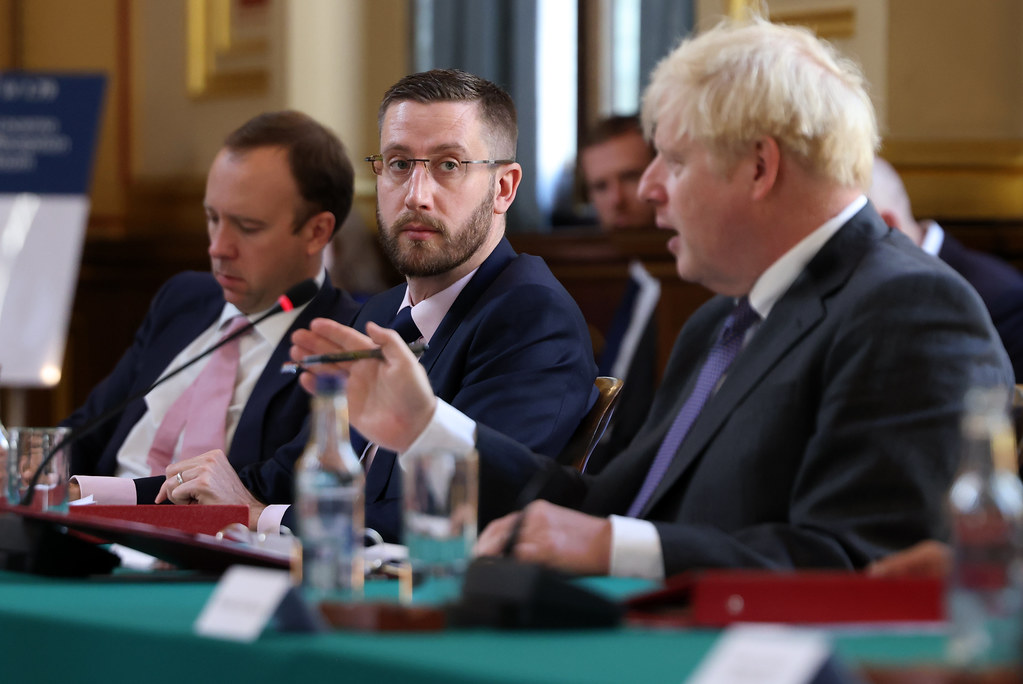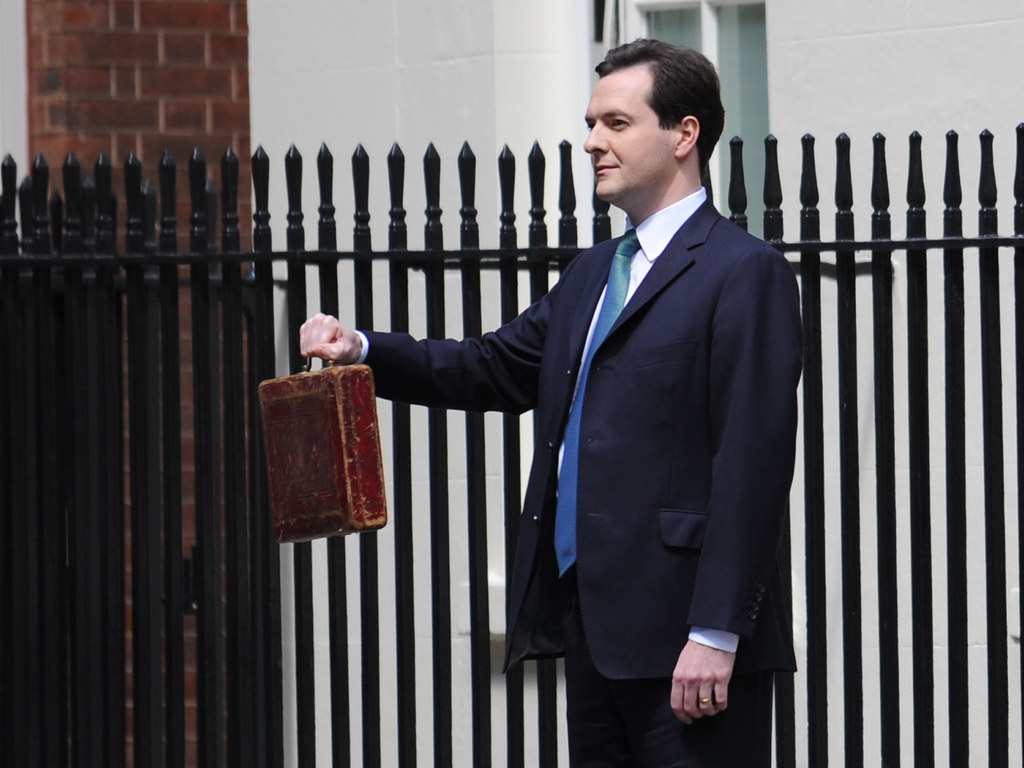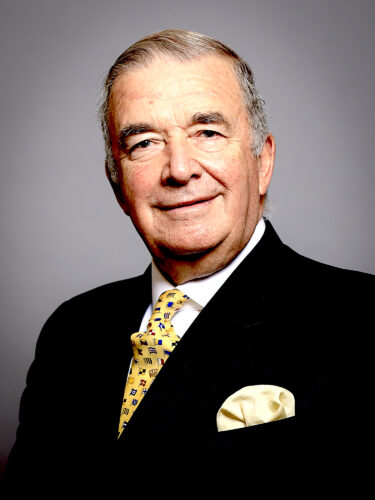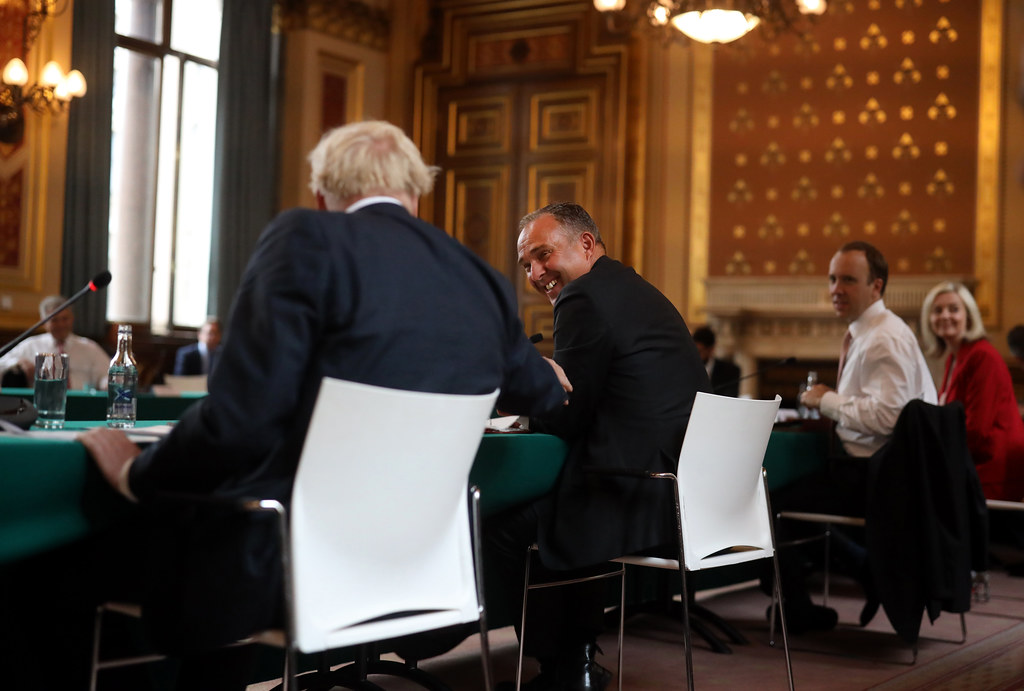Senior civil servants and military top brass move seamlessly into lucrative jobs in companies they were previously responsible for regulating, writes Richard Norton-Taylor.

Sept. 15, 2020: Cabinet Secretary Simon Case with Prime Minister Boris Johnson at a cabinet meeting. (Andrew Parsons / No 10 Downing Street)
 The behaviour of cabinet ministers, notably the former justice and foreign secretary, Dominic Raab, has shed a rare spotlight on Whitehall — Britain’s “permanent government” normally shielded by official secrecy from public view.
The behaviour of cabinet ministers, notably the former justice and foreign secretary, Dominic Raab, has shed a rare spotlight on Whitehall — Britain’s “permanent government” normally shielded by official secrecy from public view.
Senior civil servants as well as politicians are in the frame. Serious questions are being raised about the judgment in particular of Simon Case, cabinet secretary and head of the Civil Service.
Sue Gray, the senior civil servant formerly in charge of ethics who carried out the inquiry into Boris Johnson’s Partygate, has herself now become the subject of an inquiry following the disclosure that Sir Keir Starmer, the Labour leader, had asked her to be his chief of staff.
Her case is being investigated by the Advisory Committee on Business Appointments (Acoba). Case is reported to have demanded that Gray, who has already resigned from the Civil Service, should wait for as long as possible before she takes up the Starmer job.
In a display of confected outrage, Tory MPs are questioning her judgment. Rarely has there been such a shameless exhibition of hypocrisy at the heart of government.
Case’s record is far from blameless. He met Sharp to discuss then Prime Minister Boris Johnson’s financial problems but did not tell the appointments panel responsible for clearing Sharp’s appointment as BBC chairman.
He took no notes of his meeting with Sharp at which the two men were alone. He also failed to tell Rishi Sunak that a written complaint had been made about Raab before Raab was appointed deputy prime minister.
According to the Telegraph’s Lockdown Files, Case referred to opposition to Covid restrictions as “pure Conservative ideology,” suggested Sunak’s questioning of restrictions on businesses was “bonkers” and found the idea of well-heeled travellers being put in hotel quarantine “hilarious” — hardly the language expected of the country’s most senior official.
The Sharp and Sue Gray affairs have made the headlines. But the relations between senior officials and ministers and the outside world – the “revolving door” syndrome – has for long been a murky business.
Seamless Move into Private Sector

June 22, 2010: Chancellor of the Exchequer George Osborne as he leaves 11 Downing Street to deliver his budget statement in the House of Commons. (No 10 Downing)
For years, with scarcely a murmur, senior civil servants — the mandarins of Whitehall — and military top brass have moved seamlessly to lucrative jobs in the private sector. Half of all members of the Johnson and Theresa May governments took up jobs in companies which they had been responsible for regulating.
Acoba, the body supposedly responsible for scrutinising these movements chaired by the former Conservative minister, Lord Pickles, is a toothless watchdog.
Its advice is frequently ignored, especially by former ministers, while its rules — which the committee has no power to enforce — pose no serious obstacles to former civil servants and senior military figures keen to benefit financially from the experience and skills gained while working for successive governments.
Matt Hancock breached Acoba’s rules when he took part in ITV’s “I’m a Celebrity… Get Me Out of Here” and Channel 4’s “SAS Who Dares Wins” programmes but Pickles said no action would be taken on the grounds that Hancock’s role was “transparent.”
Just five months after losing his job as chancellor, George Osborne was cleared by Acoba to work for Blackrock, the global investment management company, even though he had contacted Blackrock and its competitors when in government. The Treasury’s top official said the department had “no concerns.”
‘Wheelbarrows of Cash’

Admiral Lord West in 2020. (Roger Harris, CC BY 3.0, Wikimedia Commons)
Nearly a third of all new jobs taken by former ministers and senior officials had a significant overlap with their previous brief, according to Transparency International.
Acoba often says former ministers and top officials who take on jobs in the private sector should for two years not involve themselves directly in, or “lobby,” the government departments which they formerly worked in or “draw on” “privileged information” they gained.
But the guidance is vague and wide open to an individual’s judgment and interpretation. The Ministry of Defence usually stresses it has no objection to former officials taking on jobs with arms companies, and the companies rarely object even if the official has taken on a job with a competitor.
The “revolving doors” phenomenon was once described by Admiral Lord West, the former first sea lord — head of the navy — in these terms:
“What I found, on leaving government service, is that you get paid wheelbarrows of cash by people who employ you. It is unbelievable and rather fun.”
John Suffolk, a former chief information officer in Whitehall, was employed by Huawei, the Chinese telecommunications company with extensive investments in Britain. Referring to official advice he was given, he remarked:
“There was this paragraph stating that I needed to talk to members of the Security Service, which ended up being a coffee in Caffe Nero on Trafalgar Square.”
Sir Mark Allen, MI6’s head of counter-terrorism, resigned soon after the 2003 invasion of Iraq and joined BP helping to negotiate a £15 billion oil drilling contract with Muammar Gaddafi, the Libyan dictator, embraced at the time by Prime Minister Tony Blair.
Sir John Sawers joined BP five months after retiring as head of MI6 in 2014. BP’s chairman, Carl-Henric Svanberg, remarked that Sawers “brings extensive experience of international affairs and geopolitics.”.
Good Chaps

September 2020: Mark Sedwill on his last day as cabinet secretary being thanked for his service by Prime Minister Boris Johnson. (Andrew Parsons / No 10 Downing Street)
It will be interesting to see what job Case is offered, and accepts, when he leaves the Civil Service.
Mark Sedwill, his predecessor as cabinet secretary, was appointed a non-executive director of BAE Systems, Britain’s biggest arms company, shortly after he resigned from his top Whitehall post (he is also a senior adviser to Rothschild bank).
Other recent appointments include that of Admiral Sir Philip Jones, to the post of “senior military adviser” at BAE Systems, that of Air Marshal Sir Stuart Atha, a top RAF officer responsible for operations to the post of “vice president military pperations” at BAE, and that of Martyn Williams, former head of naval ships at the MoD, to BAE Systems Maritime division.
Sir David Manning, former foreign policy adviser to Tony Blair and British ambassador to the U.S., was appointed non-executive director of the U.S. defence and arms giant, Lockheed Martin, a company about which he had previously given “political advice” to ministers.
Acoba records and decisions are only one part of a wider picture of close relationships between government and commercial interests that give rise to concern. Freedom of Information requests by Campaign Against the Arms Trade showed that BAE Systems alone took part in more than 600 meetings over a limited period.
Over a period of a little more than 15 years, senior military officers and MoD officials had taken up more than 3,500 jobs in arms companies. Executives from BAE and other arms corporations are regularly seconded to the MoD.
Lord Peter Hennessy, a leading historian of modern Britain, coined the term, the “good chaps theory” on which the country relied in the absence of a written constitution. Case was one of his students.
Hennessy’s theory may once have been dependable. It certainly is not now. A more open, transparent, culture is needed more than ever in the higher reaches of government and corporate power.
Much more effective scrutiny of the “revolving door” syndrome would be a good place to start.
Richard is a British editor, journalist and playwright, and the doyen of British national security reporting. He wrote for The Guardian on defence and security matters and was the newspaper’s security editor for three decades.
This article is from Declassified UK.
Support CN‘s Spring
Fund Drive Today


One must admit that this is quite a revealing piece but it is also guilty of giving an impression that “revolving door” is ALWAYS about the lucrative flight of ex-government high brows to the private sector which it clearly isn’t. Otherwise, how would you explain Rishi Sunak’s romp into Downing Street, the former ones migrated for CASH but the latter one did so for BASH. This is what they mean by Public-Private sector synergy that capitalizes on and vapourizes the publics’ plights and interests RESPECTively !
The “good chaps theory”?? Did he coin this term because “old-boys’ network” had become too disreputable?
The political Freak Show and institutionalized corruption in the UK just as bad as the US. BoJo is a case in point. Brits have no room to criticize the US, unless they want to demonstrate transparent gross hypocrisy.
Cronyism at its best. It’s rife.
Indeed.
I know this is trivial for a serious matter, yet the ridiculous cartoonish mental image of a “Lord Pickles as a toothless watchdog” is, from here in U.S., even sillier than a far side comic drawing!
Big cracks in all our rotten lot of corrupt institutions are showing the undersides if we but see. Write on, sir!